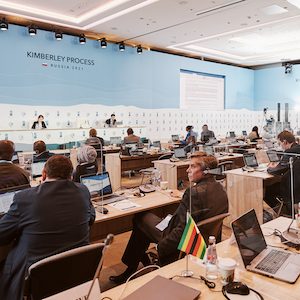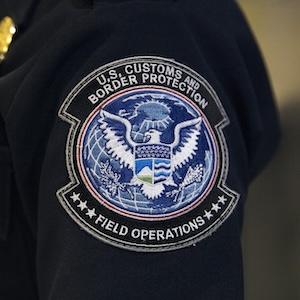
While the recent Kimberley Process (KP) plenary didn’t make progress on one long-sought-after goal—widening the KP’s definition of conflict diamonds—it did pass a nonbinding declaration pushed by host country Russia that spells out the basics of “responsible diamond sourcing.”
The KP’s Declaration on Supporting Principles for Responsible Diamond Sourcing as Best Practices—or “Frame 7″—can be seen here. The document “acknowledges the importance” of a variety of principles, including labor and human rights, development of diamond mining communities, environmental protection, and anti-money–laundering and anti-corruption policies.
Many of those issues have long been considered outside the KP’s authority, which has traditionally been limited solely to controlling conflict diamonds.
This doesn’t mean that those topics are now an official part of the KP, admits Peter Karakchiev, head of international relations for diamond miner Alrosa and head of the 2021 KP chair’s office.
In fact, it’s not clear exactly what Frame 7 will lead to, but Karakchiev believes that its passage may prove significant.
“What we tried to do is state what the KP supports as far as universally accepted best principles,” he says.
It will be up to the organization’s 2022 chair, Botswana, to determine how to apply those ideals in practice, he says.
Karakchiev hopes that introducing those issues to the KP will let the certification scheme collaborate with other organizations, including human rights, labor, and anti-corruption groups.
“I do believe that the KP should open itself up in terms of collaboration,” he says. “The KP needs to interact more with other international bodies. In the modern world, we can’t work alone.
“We have established the mechanism for such collaboration. Now, we hope Botswana will take it forward.”
Karakchiev notes that getting this language passed was no small feat. Changing KP rules requires absolute consensus—meaning all 82 participating countries must agree—and some thought the documents would bring the KP into territory where it didn’t belong.
“There were a lot of obstacles to overcome,” he says. “Many governments perceive this document as a final step to the change in the [conflict diamond] definition. There was a lot of resistance that we only overcame at the last second.”
The KP Civil Society Society Coalition called its passage a “sprinkle of hope.”
But its statement added: “It was a sad sight to see participants tone down the language of this non-binding document and seek continuous assurances that it would in no way require them to take any action on giving effect to it…. [It is] a first step, and we are hopeful that Botswana’s chairmanship in 2022 will start a trajectory on how the KP can turn these words into action.”
Also at the plenary, the KP admitted three new participating countries: Qatar, Mozambique, and Kyrgyzstan. It also began the process of digitizing KP certificates.
Russia also proposed a “ministerial meeting,” as ministers are more likely to be decision makers than the lower-level officials who attend KP meetings.
The annual plenary was held Nov. 8–12, for the first time in a hybrid format: Some participants gathered in Moscow, but others attended via Zoom. Whether the KP goes back to in-person meetings depends on the COVID-19 situation, Karakchiev says, but he expects at least the midyear intercessional to continue to be held virtually.
Top: The recent Kimberley Process plenary in Moscow (photo courtesy of the Kimberley Process)
- Subscribe to the JCK News Daily
- Subscribe to the JCK Special Report
- Follow JCK on Instagram: @jckmagazine
- Follow JCK on X: @jckmagazine
- Follow JCK on Facebook: @jckmagazine





